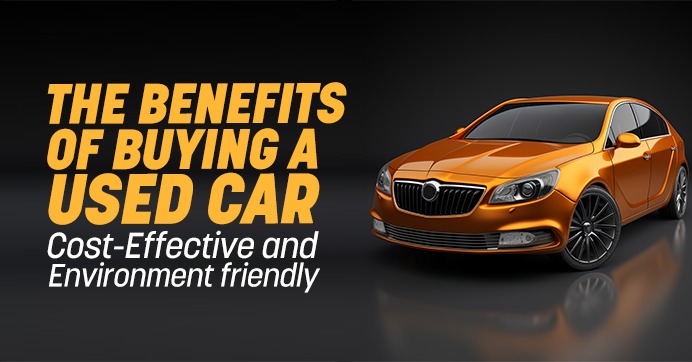The Benefits of Buying a Used Car Cost Effective and Environmentally Friendly
In a world where choices often come with hefty price tags, opting for a used car has become a smart and sustainable decision for many savvy consumers. Beyond the initial allure of cost-effectiveness, the advantages of choosing a pre-owned vehicle extend far and wide, encompassing both the economic and environmental realms. Let's delve into the myriad benefits that make buying a used car a win-win proposition.
- Cost-Effective Cruising
- Depreciation Deterrence
- Lower insurance costs
- Variety and Options
- Environmental Stewardship
- Proven Reliability
- Avoiding First-Year Model Blues
- Environmental Stewardship
- Reduced registration fees
- Certified Pre-Owned (CPO) Programs
- Lower Customization Costs
- Avoiding Initial Depreciation
- Thorough Vehicle History Reports
The most apparent advantage of purchasing a used car is the significant cost savings. New cars depreciate rapidly, losing a substantial portion of their value within the first few years. By opting for a used vehicle, you sidestep the steepest part of this depreciation curve, allowing you to enjoy a reliable and often well-maintained car at a fraction of the cost of a brand-new model. This upfront financial relief can be redirected towards other priorities, such as travel, education, or simply building a nest egg.
New cars typically lose around 20% of their value within the first year and up to 50% within the first three years. Used cars, on the other hand, have already weathered this initial depreciation storm. By purchasing a pre-owned vehicle, you shield yourself from the sharp decline in value that plagues new cars, ensuring that your investment holds its worth over a longer period of time .
Insurance costs for a used car are generally lower than those for a new one. The logic behind this lies in the reduced value of the vehicle, resulting in lower premiums. Your wallet will thank you not only at the dealership but also when it comes time to pay for insurance coverage.
Choosing a used car opens up a vast array of makes, models, and features that might have been out of reach in the new car market. Whether you have a penchant for classic models or desire the latest technological features at a more affordable price point, the used car market provides a diverse range of options to suit every taste and budget.
Beyond the financial perks, opting for a used car aligns with eco-conscious choices. Manufacturing new cars involves substantial resource consumption and emissions. By purchasing a used vehicle, you contribute to reducing the demand for new car production, indirectly lessening the environmental impact associated with the manufacturing process. It's a small yet meaningful step towards sustainability.
Modern cars are built to last, and purchasing a used car doesn't necessarily mean sacrificing reliability. With thorough research and proper inspection, you can find a used vehicle with a proven track record of durability. Many models come equipped with advanced safety features, ensuring that you can enjoy a safe and dependable ride without compromising on technology and security.
New models often come with unforeseen issues and recalls in their first year. By opting for a used car, you allow other drivers to be the pioneers, dealing with any initial hiccups while you benefit from a more refined and reliable version.
Beyond the financial perks, opting for a used car aligns with eco-conscious choices. Manufacturing new cars involves substantial resource consumption and emissions. By purchasing a used vehicle, you contribute to reducing the demand for new car production, indirectly lessening the environmental impact associated with the manufacturing process. It's a small yet meaningful step towards sustainability.
In many regions, the cost of registering a vehicle is tied to its value. Since used cars have already experienced significant depreciation, the registration fees are often lower compared to those for new cars. This can result in additional savings over the life of the vehicle.
Many manufacturers offer Certified Pre-Owned programs, providing peace of mind for used car buyers. These programs include rigorous inspections, extended warranties, and additional benefits, ensuring that the used car meets certain quality standards. Choosing a CPO vehicle can offer the reliability of a new car with a more attractive price tag .
New car buyers often pay a premium for additional features and customization. When purchasing a used car, you may find a model with the features you desire at a lower overall cost. This allows you to enjoy upgraded options without the hefty price tag associated with customizing a new car
New cars experience the most significant depreciation in their first few years on the road. By opting for a used car, you sidestep this initial depreciation hit. As a result, the rate of depreciation tends to slow down, preserving the value of your investment over time.
Thanks to advancements in technology, obtaining a comprehensive vehicle history report has become a standard practice when buying a used car. These reports provide valuable insights into the car's past, including accidents, title information, and maintenance records. Armed with this information, you can make informed decisions and ensure the vehicle's reliability.
Choosing a used car extends far beyond a mere financial decision; it's a strategic and environmentally conscious choice that offers a plethora of benefits. From reduced registration fees to the convenience of immediate availability, the advantages of buying a used car continue to make a compelling case for those seeking value, reliability, and sustainability in their automotive investments.

